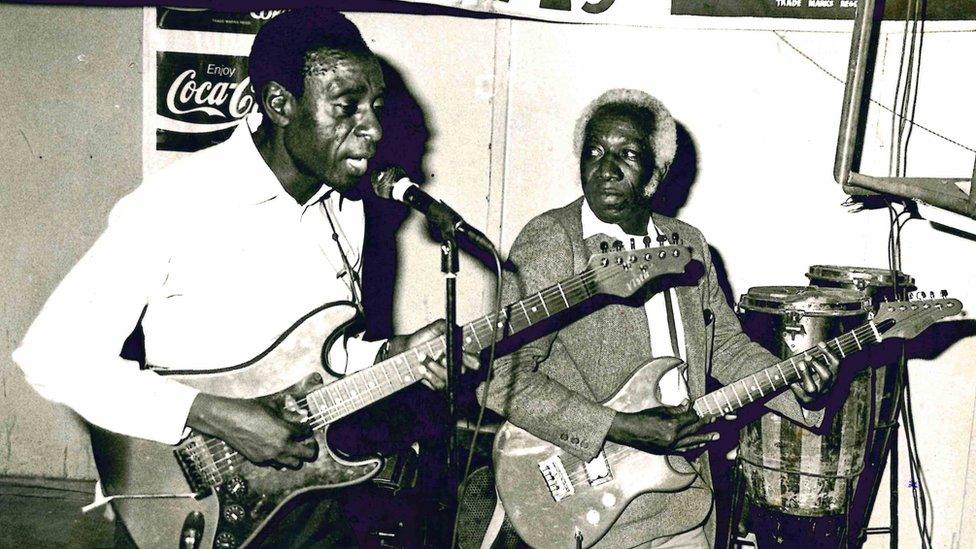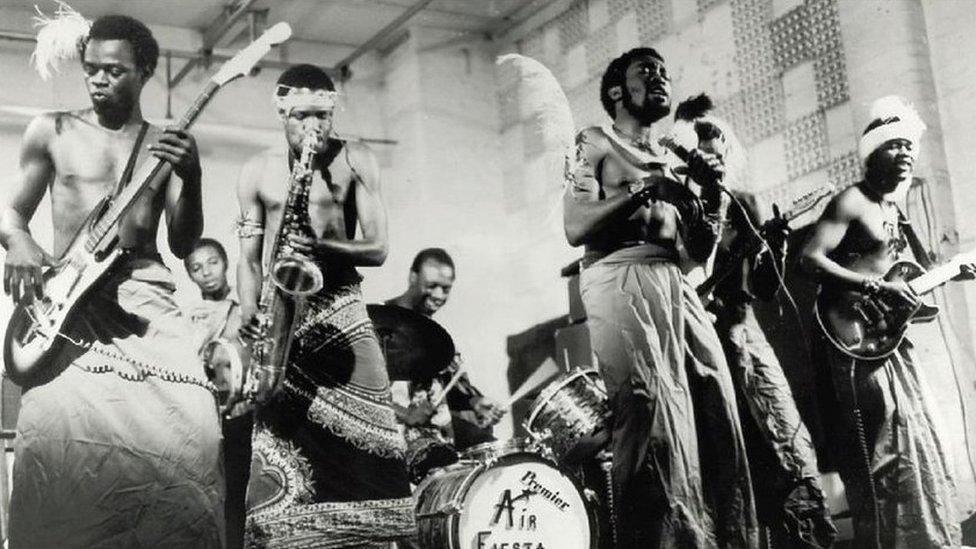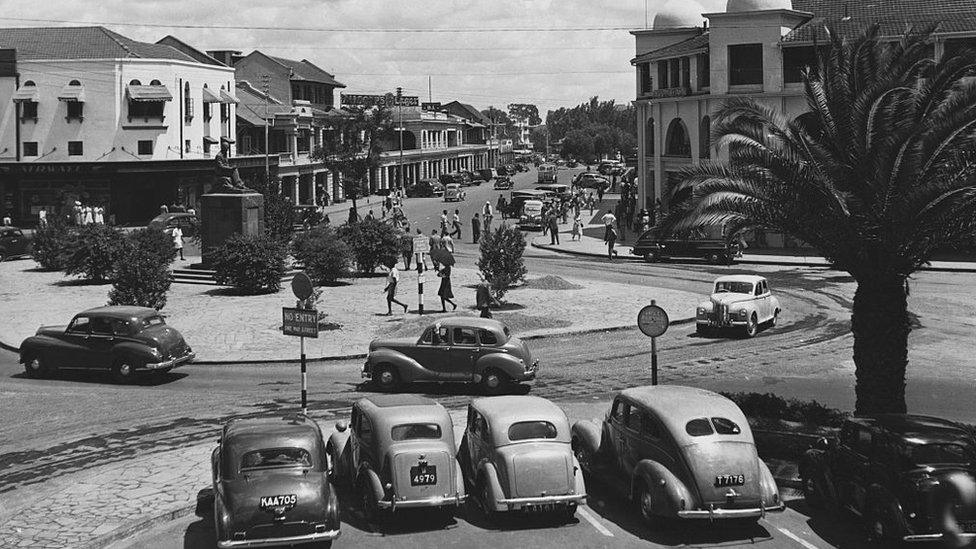John Nzenze: The founder of 'Africa's best band'
- Published

John Nzenze (L) and Daudi Kabaka (R) started out as hotel waiters
John Nzenze, the veteran Kenyan musician who is being buried on Saturday, was belting out popular songs before the country gained independence more than 50 years ago.
The singer, guitarist and dancer was among the last of the pioneer artistes who popularised the Kenyan Twist genre of music, and was part of a band that produced East Africa's finest funk in the 1960s and early 1970s.
"When you become a celebrity, you become a bit arrogant, and in my arrogance I built my own band, the Air Fiesta Matata Band," he said in an interview in Swahili in January, external.
The band - which included refugees from Congo, now known as the Democratic Republic of Congo - found international fame a few years after it was formed.
In 1968, it was ranked as the third best band in Africa at the All African Music Festival in Algeria, and the following year it stayed in Ethiopia for several months to perform for the country's emperor Haile Selassie.
In 1971, the BBC African Service crowned it the best band in Africa and it performed in the UK the following year alongside music greats such as James Brown and the Osibisa group.

Air Fiesta Matata Band performed in the UK in 1972
But the tour also heralded the end of the band, as some of its members - both Kenyan and Congolese - decided to remain in the UK.
"When it came to return [to Kenya], the Congolese said we'd rather be refugees here than in Kenya... The band became paralysed. We split there in London," Nzenze said.
But his stature as a musician continued to grow as he played solo, joined other bands, and worked as a producer at Philco Studio in Kenya's capital, Nairobi.
How Nzenze's career started
Born in Nairobi in British-ruled Kenya in 1940, Nzenze was schooled in the city and in western Kenya, where his parents had originally come from.
His education ended when he was in junior secondary school, after which he sought employment in a hotel.
However, in his teens, he started playing a guitar that belonged to his father, who was part of the railway company band where he worked.

John Nzenze grew up in 1940s Nairobi
At the well-known Norfolk Hotel, where he had found work as a waiter, Nzenze shared a room in the staff quarters with Daudi Kabaka, with whom he started composing and recording songs.
But Nzenze was unhappy that Kabaka claimed all the credit, even for those that he had composed.
He wanted to have his songs and name recognised on radio, just like Kabaka, and thus approached a group of musicians from a different recording company which helped him record his first single, Angelike.
Saying it had meant a lot to have his songs played on radio, he added: "It was not about money."

You may want to watch:
The DJs remixing traditional Kenyan music

Angelike, which became one of his most famous songs, was a plea to a girlfriend to return home despite the "domestic issues" between them.
The love triangle
But just before Angelike, he had sung with Kabaka a song about Agneta, a lover, who also happened to be his friend's lover - though he did not know it at the time.
The lyrics, translated from Swahili, include:
I met my first girlfriend in Nairobi
She loved me and I loved her back
I asked if she had a husband
She told me, I don't even have a lover
I went with her to her place
In Shauri Moyo at the tobacco company's houses
As we slept, I heard a 'knock knock' sound
Open, I'm the owner of the house
Miss Agneta, it's very shameful
To date me and that other man
What if I had fought with that man
And hurt each other, what would you have done?
Nzenze later said the song was based on a true story, though he did not reveal the names of those caught up in the love triangle.
If a woman loves your song, even the men will love it"

He was a mellowed songster who sang effortlessly with intimate words, praising and imploring the women he loved and at times consoling himself.
"If you don't make a woman happy, your music won't have much value. If a woman loves your song, even the men will love it," he once said.
"We were young and we were clothed in love," he added.
Scornful of today's music
Nzenze flourished in live performances, and criticised the music made nowadays with digital technology, saying it did not help musicians perfect their craft.
"Some of the musicians can't even tell what key their music is played; the only person who knows is the programmer," he said.
He added that the only reason his music survived for so long was because of the content.
"I played mature music, not the music that is produced today and then tomorrow it's not on the market," he told BBC Swahili in 2015.

You may also be interested in:

Other than Angelike, Nzenze's other memorable hits were Ninamulilia Susanna (I'm crying for Susanna) Veronica, Ni Vizuri kuwa na Bibi (It's good to have a wife) and Marashi ya Warembo (Women's perfume).
But, he told BBC Swahili, it was Angelike, his signature song, that enabled him to travel abroad. He played for months in 2004 in a cruise ship that sailed through many countries, including Japan and Singapore.
"Music pays, once you get to a certain level, it pays… Angelike took me to many countries," he added.
He also toured the US in 2014, teaming up with fellow Kenyan Peter Akwabi to sing his famous song at the Smithsonian Folklife Festival:
Allow YouTube content?
This article contains content provided by Google YouTube. We ask for your permission before anything is loaded, as they may be using cookies and other technologies. You may want to read Google’s cookie policy, external and privacy policy, external before accepting. To view this content choose ‘accept and continue’.

He also understood the perils of copyright infringement, especially in a country where ripped CDs are often sold on the streets and would be played on clubs and other establishments without artists earning anything.
'A talent beyond spectacular'
Nzenze co-founded the body that later became the Music Copyright Society of Kenya (MCSK), which he served as a board member.
The government recognised his achievements in 2009 when - alongside four other pioneering musicians - he received the Head of State Commendation (HSC) award from then President Mwai Kibaki.
Nzenze retired in 2016, and settled in the small town of Kaimosi in western Kenya. He died in hospital on 30 May from prostate cancer. He was 80.
Kenya's Deputy President William Ruto paid tribute to him as a "great soul, a golden musician, creative and a talent beyond spectacular, a true and original voice".
"We shall forever cherish his magnificent work and his memory," he said.